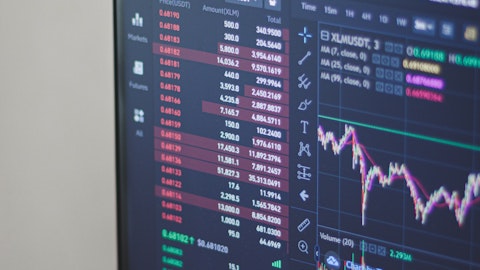Jeremy Barnum: For sure, for sure, which actually links to the broader point that what — in terms of your question about how much is this helping the current NII story, it goes to the larger point of it holistic, through the cycle, multi-channel, fully engaged customer strategy, which requires a lot of investment in branches, obviously, but also in digital services of all sorts. So in many ways, you can see the current environment as a little bit of a payoff of that investment, but that’s not like, therefore, we stop investing, obviously. So I guess that’s part of the answer. And I guess, your other question is the benefits of being the biggest tech spender. I just think like it’s sort of mandatory right? I mean, we’re big and very technology-centric business, and the world is competitive.
And everything is changing. Younger generations have different expectations, and we have to be nimble, and we have to be on our front foot. And otherwise, we risk getting severely disrupted. So I don’t know if Jamie wants to add anything.
Jamie Dimon: And just the competition, we look at it as, it’s Wells. It was coming back, which I’m happy for you guys. It’s obviously [Marcus, it’s Apple. It’s Chime, it’s Dave] (ph). There’s a lot of people coming up with these businesses in different ways. Some have been quite successful, like Stripe in payments. And so we want to be very good and very competitive. Some of that tech spending is things which are almost a sine qua non, which is cybersecurity, data center resiliency, regulatory requirements and things like that, which we simply are going to do and be very, very good at to protect the company.
Mike Mayo: As it relates to AI specifically, which is the talk of the town, I guess the consensus among people outside the banking industry is that banks will not win that battle, including JPMorgan. You won’t control the front end. What are you doing with AI to make a difference now? Or is this simply a moonshot?
Jamie Dimon: Well, I don’t agree with that statement. Banks have an extraordinary amount of proprietary data in addition to when you do like a large language model, that’s public data. It’s looking at everything in the Internet or everything that’s ever been published or something like that. But AI is an extraordinarily good tool to use. We just put a woman who is running at our table. So it’s data analytics, AI, et cetera. And there are multiple types of AI. So we use AI for risk, fraud, marketing, prospecting. And the management team is getting better and better and say, how can we use data to do a better job to reduce errors, to serve clients better, to have a salesperson have co-pilots. They know why even the clients calling us something like that. And so we simply have to do it. Does it create opportunity for disruptors to come in? Yeah, of course. That’s always been true with technology and — but we’ll be quite good at it.
Mike Mayo: And then lastly, I think you had made a mention at a conference about investment spend or tech spend over the next year. Where do you stand on that?
Jeremy Barnum: Yeah. No, because you did ask a little bit about the expense outlook for next year. So I think at the conference, we said I think the consensus was $88 billion, but we’re still going through budget process, et cetera, et cetera. So that’s still true. I think we’re still kind of in the ballpark, but I would say at the margin, there’s going to be a little bit of upward…
Jamie Dimon: First Republic too, or no?
Jeremy Barnum: This is all now including First Republic. And I think there’ll be a little bit of upward pressure on that as we sort of do our usual thing and look at all the opportunities that we see and the investments that we want to make. So no surprise in that sense that we’re going to invest prudently. Nothing dramatic, but probably a little bit of upward pressure on the margin.
Mike Mayo: All right. Thank you.
Operator: Thank you. Our next question comes from Jim Mitchell with Seaport Global. You may proceed.
Jim Mitchell: Hey, good morning. Jeremy, do you think there’s any receptivity among regulators regarding the double counting, not only of operational risk, but I think you alluded to this earlier in the Markets business, but there’s clearly double counting and market risk in the trading book. Is there any receptivity?
Jamie Dimon: Can I just answer real quickly? We don’t really know. It’s a one-sided conversation generally. They say put in your comments. So everyone’s going to put in extensive comments kind of like you heard from Jeremy, and we don’t really know. We don’t really know what’s going on inside the Fed, how many people get involved. In my view, it’s become a very politicized process as opposed to the technical analysis, I think that’s required to do it exactly right. So we’ll see.
Jim Mitchell: Okay. And then if it weren’t to change, and you talked about the potential impact on liquidity in the Markets business, specifically, is that a JPM pulling out of certain business type of event? Or is that — is it more a comment that there’ll be fewer providers of liquidity as less scaled players exit? And maybe that’s all else equal, a market share gain opportunity for JPMorgan in a smaller business?
Jamie Dimon: I think — so if you look at Markets alone, it’s a huge, I think, 60% increase in capital. And if you look at it, you can do that by product, for some products it worth it than for others. But generally, it’s bad across all products. And market make — but the really important thing is market making is a critical function. And if you look at the world, only so many large market makers who can make markets for governments, hospitals, cities, schools, states, IMF, World Bank, BlackRock, Blackstone and all those various things to buy and sell for their clients in size, and market makers have a different function than hedge funds. And I don’t know what the real intent was with this, this is another one, I think, needs to be really thought through.
What are you trying to accomplish? We do market making quite safe. We’ve never lost the kind of money that people talk about in market making in the global market [shock] (ph) or something like that. But the other thing about market making, I do agree it could actually force some people out. It will force lower positions, which is why I think it’s a little risky, but it may also force more consolidation. And so clients, since they need it so much, there may be consolidation in unintended way in market making and obviously more volatile markets because with all the constraints for the LCR, SLR, capital, et cetera, you will constantly be up against limitations on what you can do.





